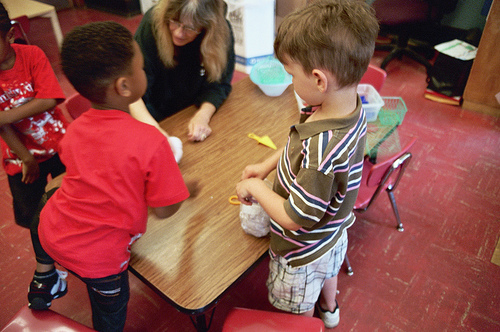A Utah state senator is proposing to let private investors put up $10 million dollars to fund more preschool for “at-risk” students eligible for special education. If the program boosts learning, the state would pay the investors back.
Sen. Aaron Osmond (R–South Jordan) is drafting a bill to spend taxpayer dollars only when schools have addressed developmental problems before 6,000 “at-risk” preschoolers enter elementary school. Osmond said the state currently spends more than $300 million on special education, a cost he says more early-education spending could reduce.
“We’re spending an enormous amount of money trying to assist at-risk students coming into public education with either poor English skills or none at all,” he said. “Many are in the special education program because of developmental language delays, and others are being helped through English Language Assistant support as part of their regular classes.”
Many Kids Labeled ‘Delayed’
Special education enrollment attributed to developmental delays is growing at four times the rate of regular enrollment in Utah, Osmond said.
“We still haven’t been able to number the students that are struggling,” he said.
Typically, when children enter special education in early grades, they remain in it for the duration of their schooling, a Voices for Utah Children (VUC) report stated.
Osmond says he plans to base his program on several successful Utah programs aimed at developmental problems children exhibit before entering elementary school.
VUC, in partnership with Granite School District Preschool Services, surveyed 4-year-olds eligible for special education programs and living in poor areas. Researchers found the children who attended high-quality preschool used special education services far less than “at-risk” children who did not.
“In the Granite School District in Utah, the mean scores for all children entering preschool would have qualified them for special education,” reads the report. “Upon exiting preschool after 2 years, the mean score was in the average range.”
Out of 238 preschoolers that participated in Granite’s program over three years, only seven were referred to special education in elementary school.
Preschool Quality Questioned
For decades, research has shown a high-quality, academically oriented preschool can benefit some students during kindergarten, said Vicki Alger, a senior fellow of the Independent Women’s Forum.
“Yet those academic gains successively fade throughout the early grades, which suggests taking a closer look at the quality of elementary education available to students,” she said. Osmond said the opposite, claiming “at risk” students in these preschool programs tend to maintain their progress.
Private Companies Pay
Osmond plans for a public-private partnership to fund this expansion.
Private companies would contribute dollars for the new programs upfront. Over the next five to seven years, the state would set aside approximately $1.5 to $2.0 million per year to prepare for a results-based payback. If the programs fail, the state would keep the money it had set aside.
“We have the evidence that shows these sort of programs are working,” he said. “The investors are interested because they know the results are there.”
VUC research suggested this program would save approximately $1 million dollars in special education in the first three years.
Better Idea: Parent Choice
Alger says directing funds into a solid academic foundation for students makes sense, but she recommends a school choice model some states already use.
“A better policy model is Arizona’s Empowerment Scholarship Account program,” she said. “Under the program, the state deposits 90 percent of the state per-pupil funding amount into designated accounts when parents of children with special needs choose not to enroll them in government schools.”
Parents can use those funds to purchase private education services they believe best meet their children’s needs.
“Utah lawmakers should also consider implementing a corporate tax-credit scholarship program, allowing businesses to make tax-deductible contributions to nonprofit scholarship-granting organizations,” she said. “Such programs expand education options, conserve limited public funds, and better ensure that students get the services that are right for them. Such policies are far better than a well-intentioned, one-size-fits-all preschool model.”
Learn More:
“A Sustainable Financing Model: High Quality Preschool for At-Risk Children” Voices for Utah Children, October 2011: http://www.uw.org/our-work/research-reports/a-sustainable-financing-model-for-high-quality-preschool-evidence-from-the-granite-school-district-in-utah-updated-10-26-11.pdf.
Image by Sarah Gilbert.




